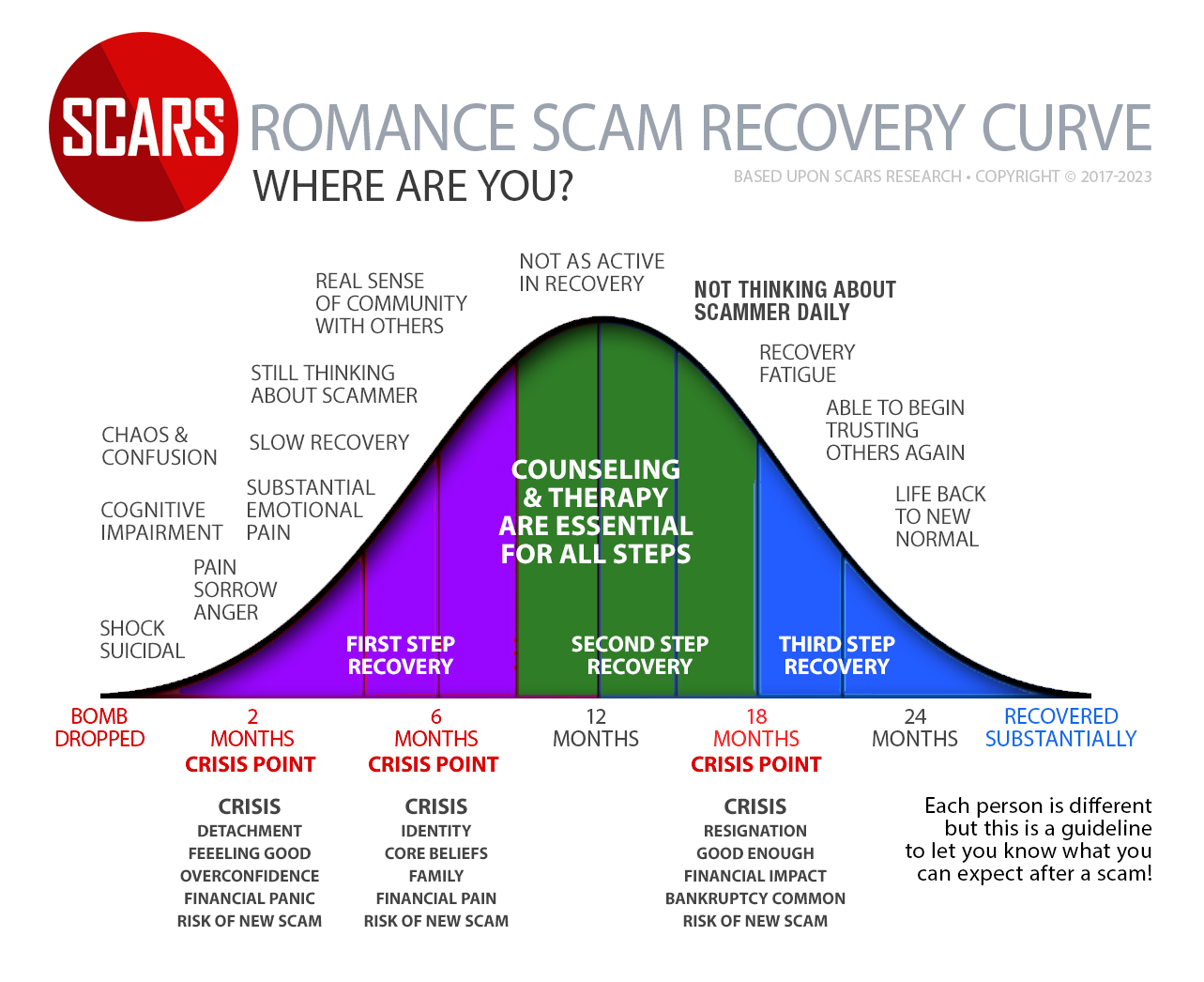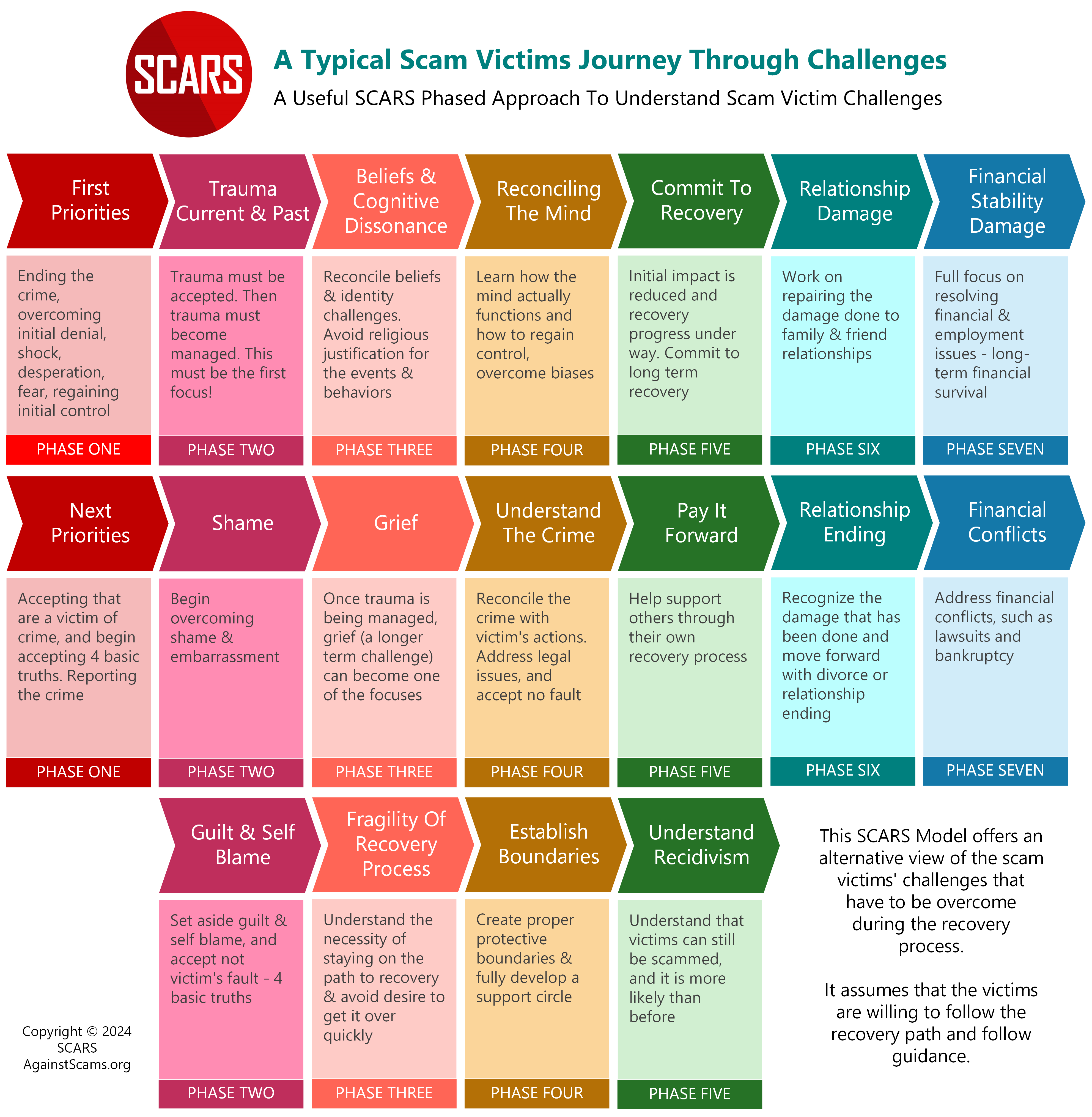Scam Victim Identity Crisis – Very Common in Victims Several Months After the Scam Ends
Helping Scam Victims Understand How to Navigate through Their Second Crisis During Recovery
Primary Category: Scam Victim Recovery Psychology
Authors:
• Vianey Gonzalez B.Sc(Psych) – Licensed Psychologist, Specialty in Crime Victim Trauma Therapy, Neuropsychologist, Certified Deception Professional, Psychology Advisory Panel & Director of the Society of Citizens Against Relationship Scams Inc.
• Tim McGuinness, Ph.D., DFin, MCPO, MAnth – Anthropologist, Scientist, Polymath, Director of the Society of Citizens Against Relationship Scams Inc.
About This Article
Scam victims often experience multiple crises after the scam ends, but the identity crisis that occurs between six months to a year can be particularly devastating.
During the initial phase, victims focus on the immediate impact, like financial loss and cutting ties with the scammer. However, as time passes and they begin to reflect, they are hit by a deep psychological crisis where they question their identity, self-worth, and ability to trust themselves and others.
This delayed crisis is marked by feelings of continuing shame, residual guilt, and emotional disconnection, as victims struggle to reconcile their previous self-image with their perceived gullibility.
The social stigma surrounding scams further fuels this internal conflict, leading to isolation, hypervigilance, and even depression.
Without proper support, this identity crisis can severely hinder their recovery, and in some cases, lead to suicidal ideation due to overwhelming emotions and a loss of self-trust.

Scam Victims Experience Several Crises After the Scam Ends but the Identity Crisis at About 6 Months to 1-Year Can be the Very Devastating
The Scam Victim Identity Crisis
An identity crisis from a scam victim’s perspective typically emerges several months after the scam ends, with many victims reporting these crises around the six-month to 1-year mark.
This delayed response is based on insights gathered from over 10,000 victims, showing that this period is when deeper psychological issues often surface.
Initially, victims are focused on immediate damage control, such as financial recovery or cutting off communication with the scammer, and stabilizing themselves. As time passes and the shock begins to wear off, the emotional and psychological repercussions or consequences set in more intensely.
At around the six-month to 1-year point, victims have had time to recover somewhat and reflect on their experience, and this is when this crisis tends to emerge. They may start questioning who they are, their judgment, and their ability to trust themselves and others. This delayed onset might be because, in the immediate aftermath, they are preoccupied with the immediate trauma and practical aspects of recovery. Once those tasks have been addressed, the emotional weight of the betrayal, manipulation, and loss of self-trust begins to sink in.
Crisis Impact
During this time, victims may feel disconnected from their previous sense of self. They often find it hard to reconcile the person they believed they were with the reality of having been deceived. The self-image of being careful, responsible, or intelligent is now in conflict with the feelings of having been naive or gullible. This internal conflict can trigger a profound identity crisis, leaving them uncertain about their judgment, self-worth, and ability to trust others again.
Moreover, the societal stigma attached to being scammed can exacerbate this crisis. Victims may face judgment or ridicule from their social circles, further fueling feelings of shame and self-doubt. The six-month mark can be particularly pivotal as it coincides with the realization that the scam’s emotional toll may take longer to heal than they initially thought.
The identity crisis at this stage can make the recovery process more complex, as victims struggle not only with financial or emotional loss but also with the task of rebuilding a sense of self.
How this Identity Crisis Functions
The psychological impact of an identity crisis for scam victims, particularly around the six-month to 1-year mark, can be profound and complex.
At this stage, victims have typically moved beyond the initial challenges, allowing deeper emotional and psychological effects to surface. This is the point where the repressed emotions begin to emerge and even though victims think they have accepted the situation, those portions of the crime that they have not really accepted make themselves known.
This identity crisis can lead to an intense reevaluation of the self, often accompanied by feelings of shame, guilt, and confusion. Below is a detailed explanation of the psychological and neurological mechanisms involved. This is not the same sense of shame, guilt, and self-blame that appeared immediately after the scam. These are the deeper core beliefs that cannot be as easily negotiated and accepted.
For those victims that face this crisis, and almost all victims should or they are resisting or in denial, it becomes an almost total reevaluation of self.
Psychological Impact of the Crisis
Erosion of Self-Trust: After months of reflection, victims often grapple with feelings of betrayal—not only by the scammer but by their own judgment. They may question their decision-making abilities, leading to a significant loss of self-confidence. This loss of trust in their intuition and judgment can have lasting effects, making victims feel vulnerable in future decision-making scenarios. Of course, this is not hypothetical. Scam victims actually should not yet trust themselves and there is the problem, many rationalize the crime and believe they have recovered or recovering their sound decision-making. Yet this can take much longer periods to restore.
Emotional Disconnection: Many scam victims experience a disconnection between their previous self-image and the reality of having been deceived. This cognitive dissonance can create a deep psychological conflict, where victims feel estranged from their pre-scam identity. They may struggle to reconcile the person they thought they were—someone careful, intelligent, and discerning—with their experience of falling for a scam.
Shame and Guilt: Shame often plays a dominant role in the identity crisis, but as we said, this is a different form of shame and guilt not so much based on the actor of the crime, but on who they really are. It is not so much that victims should have “known better” or seen the warning signs but instead much now confront the question ‘is this who they are?’. This deep self-directed shame can be compounded by external factors, such as social stigmas or judgments from family and friends. Guilt often accompanies these feelings, not so much because they have lost large sums of money but it’s about how they jeopardized their own and their family’s financial security.
Profound Sadness: Sadness often accompanies this. This is a mourning for the loss of who they once were, who believed in safety and security. This sadness can come with the full realization of just how unsafe the world is and how they are so poorly prepared to live in it.
Hypervigilance and Paranoia: As victims’ sense of security is eroded, they may become hypervigilant, constantly looking for threats or signs of deception in their daily lives. This heightened state of alertness, while an understandable defense mechanism, can interfere with normal functioning, causing anxiety and paranoia in situations that would have previously seemed innocuous.
Social Withdrawal: The shame and confusion of an identity crisis can lead to social withdrawal. Victims may isolate themselves, believing that others view them as foolish or gullible. This social withdrawal can exacerbate feelings of loneliness and depression, further impeding the recovery process.
Depression and Anxiety: The long-term psychological effects of this identity crisis often include depression and anxiety. Victims may feel stuck in a cycle of self-blame, unable to move forward or regain a sense of normalcy. The cognitive dissonance between their past self and current reality can create a pervasive sense of hopelessness, contributing to the development of depressive symptoms. This is where counseling or therapy is so critically important.
Neurological and Cognitive Processes at Work
Amygdala Activation and Emotional Response
The amygdala, the brain’s center for processing emotions like fear and anxiety, plays a significant role in the emotional response to a scam. During the early stages of the scam, the amygdala may have been triggered by the scammer’s manipulative tactics, particularly those involving fear (e.g., threats of financial ruin). As time goes on, this heightened emotional state can become a chronic issue, contributing to long-term anxiety and emotional dysregulation.
During an identity crisis, the amygdala may remain hyperactive, particularly as victims replay the scam in their minds. This repetitive activation can lead to continued emotional distress, reinforcing feelings of guilt, shame, and anxiety.
Prefrontal Cortex Involvement and Decision-Making
The prefrontal cortex, responsible for higher-order thinking, decision-making, and self-regulation, is critical in processing complex emotions and conflicts. During an identity crisis, the prefrontal cortex may become overtaxed (cognitive overload/overwhelm) as the victim grapples with conflicting thoughts and emotions. Victims struggle with cognitive dissonance—trying to rationalize how they, as rational and capable individuals, could have become victim of the scam. This internal conflict can impair the prefrontal cortex’s ability to process emotions logically, further contributing to anxiety and poor decision-making. This actually makes it harder to understand and accept the situation more completely, deepening the crisis.
Hippocampus and Memory
The hippocampus, which plays a key role in memory formation and retrieval, is also involved in the processing of traumatic memories. During the identity crisis, victims may find themselves revisiting the memories of the scam in an attempt to understand what went wrong. However, the trauma of being deceived can distort these memories, leading to fragmented recollections or selective memory of the scam.
This cognitive distortion can make it difficult for victims to achieve and sense of closure, as they can obsess over specific details while overlooking the larger context of how they were manipulated. The overactivation of the hippocampus in response to trauma can worsen feelings of guilt and shame, as victims focus on moments they feel they “could have, would have, should have” caught the deception.
Cognitive Overload and Ruminative Thinking
Cognitive overload, particularly around the amount of money lost or the extent of the manipulation, can lead to ruminative thinking. Victims may obsessively replay ‘what if’ scenarios in their heads, trying to figure out how they could have avoided the scam. This toxic ruminative process, while intended to make sense of the event, usually serves to deepen feelings of distress and entrench negative thought patterns.
As the brain becomes overloaded with these repetitive thoughts, victims can experience decreased cognitive clarity and decision-making ability, making it harder to move forward and find sound solutions. This cognitive overload can also perpetuate a cycle of hypervigilance, making it difficult to trust oneself or others in the future.
Cortisol Release and Stress Response
Chronic stress associated with an identity crisis can lead to the sustained release of cortisol, the body’s stress hormone. Elevated cortisol levels can contribute to a range of negative physical and psychological effects, including fatigue, difficulty concentrating, and a weakened immune system. Over time, this chronic stress can compound the victim’s emotional distress, creating a feedback loop that prolongs the identity crisis and hinders recovery.
The Long-Term Psychological Impact
The identity crisis that arises months after the scam can have significant long-term effects on scam victims. If left unaddressed, the combination of emotional distress, cognitive dissonance, and physiological stress can lead to more severe psychological disorders such as clinical depression, generalized anxiety disorder, or post-traumatic stress disorder (PTSD). Victims may also develop maladaptive coping mechanisms, such as avoidance or substance use, to manage their emotional pain.
This identity crisis experienced by scam victims months after the scam is driven by a combination of emotional, cognitive, and neurological factors. The delayed nature of the crisis allows these elements to accumulate, leading to profound psychological distress. Understanding the brain’s role in this process is important for developing effective therapeutic interventions and support systems to help victims recover.
All scam victims need to make sure that they have full support from professional support providers such as the SCARS Institute, Counseling or a Therapist, and are caring for their mental and physical wellbeing.
Increased Risk of Suicide
During this identity crisis, scam victims often experience thoughts of self-harm.
Particularly around six months to 1-year after the scam ends, there is a critical need to be vigilant for signs of suicidal ideation. This period is when the psychological and emotional impact of the scam reaches its peak, and victims may feel overwhelmed by unresolved guilt, continuing shame, and a loss of self-worth. The combination of these factors can create a dangerous mental state in which suicide may seem like a viable escape from the profound emotional pain and consequences of their actions.
Why Suicidal Ideation Peaks During the Identity Crisis
Accumulation of Psychological Distress: The emotional burden of being scammed often intensifies over time. Initially, victims may focus on practical concerns such as financial loss or legal matters. However, months later, the emotional toll—feelings of betrayal, shame, and loss of identity—becomes more apparent. The overwhelming cognitive dissonance of having been deceived, especially if they had believed they were in control or intelligent enough to avoid such situations, creates deep emotional conflict. This accumulated stress can lead to hopelessness and feelings of helplessness, key drivers of suicidal ideation.
Isolation and Shame: By this stage, many scam victims withdraw from social connections due to feelings of embarrassment and fear of judgment. They may isolate themselves from friends and family who they believe will not understand, further deepening their emotional isolation. This disconnection from supportive networks exacerbates loneliness and despair, which can lead victims to contemplate suicide as a way out of their perceived shame and failure.
Trauma and Repeated Mental Replays: Scam victims often ruminate on the details of how they were manipulated, replaying the events over and over in their minds. This mental repetition can intensify feelings of self-blame, reinforcing the narrative that they are “foolish” or “gullible” for falling victim. This cycle of negative thinking can wear down psychological resilience, leading to depressive episodes and suicidal thoughts.
Erosion of Self-Worth and Identity: The identity crisis that unfolds in the months after the scam centers on a loss of self-trust. Victims often struggle to reconcile who they were before the scam with who they feel they have become after it. This deep sense of identity erosion, where victims may no longer see themselves as competent or capable individuals, can severely damage their sense of purpose and worth, further heightening the risk of suicide.
What is Happening in the Brain?
Amygdala and Emotional Overwhelm: During this time, the amygdala, which regulates fear and emotional responses, remains hyperactive. This keeps victims in a heightened state of anxiety and emotional distress. When negative emotions like fear, guilt, and shame become overwhelming, the brain’s capacity to regulate these emotions diminishes, leading to feelings of being trapped in unbearable emotional pain.
Prefrontal Cortex and Impaired Decision-Making: The prefrontal cortex, responsible for rational thought and decision-making, often becomes compromised due to prolonged stress. In this state, victims may struggle to think clearly, and the prospect of suicide may be viewed as a rational solution to end the emotional turmoil. The brain, unable to effectively process alternatives or weigh long-term consequences, may fixate on suicide as the only way out.
Chronic Cortisol Levels and Fatigue: Chronic stress associated with scam trauma leads to sustained high levels of cortisol, the stress hormone. Over time, this can contribute to emotional exhaustion and a sense of numbness, further deepening depression. This emotional fatigue can make suicide appear as the only option to escape the pain and suffering.
The Importance of Intervention and Support
It is crucial for those supporting scam victims to recognize the warning signs of suicidal ideation during this identity crisis phase. Common warning signs may include:
-
-
- Talking about feeling hopeless or having no reason to live.
- Expressing feelings of being a burden to others.
- Increased isolation and withdrawal from loved ones.
- Drastic mood changes, such as becoming unusually agitated or withdrawn.
- Preoccupation with death or thoughts of self-harm.
-
Steps for Helping Scam Victims
Encourage Open Conversations: Victims may feel ashamed to discuss their thoughts of suicide. Creating a safe, non-judgmental space where they can express their emotions is critical. Let them know that what they are feeling is valid and that professional help is available.
Connect Them with Mental Health Resources: Scam victims often need more than just emotional support from friends and family—they may require professional mental health care. Therapy, especially trauma-informed approaches like Cognitive Behavioral Therapy (CBT) or Eye Movement Desensitization and Reprocessing (EMDR), can help victims process their trauma and regain a sense of self-worth.
Watch for Isolation: Social withdrawal is a key risk factor for suicidal ideation. Encouraging victims to stay connected with their support network and avoid isolation can help them feel less alone in their struggle.
Immediate Action: If someone expresses suicidal thoughts, it is crucial to take immediate action. Reach out to mental health professionals or hotlines, such as the National Suicide Prevention Lifeline, and ensure that the victim is not left alone during periods of acute distress.
Summary
The identity crisis following a scam is an especially vulnerable time when scam victims are at heightened risk for suicidal ideation. Understanding the psychological and neurological impacts of this crisis is essential for providing timely and effective support. Family, friends, and mental health professionals must be vigilant during this period to prevent tragedy and help scam victims rebuild their lives.
Typical Scam Victim Recovery Curve – Including Crises
Typical Scam Victim Recovery Journey
-/ 30 /-
What do you think about this?
Please share your thoughts in a comment below!
A Note About Labeling!
We often use the term ‘scam victim’ in our articles, but this is a convenience to help those searching for information in search engines like Google. It is just a convenience and has no deeper meaning. If you have come through such an experience, YOU are a Survivor! It was not your fault. You are not alone! Axios!
Statement About Victim Blaming
SCARS Institute articles examine different aspects of the scam victim experience, as well as those who may have been secondary victims. This work focuses on understanding victimization through the science of victimology, including common psychological and behavioral responses. The purpose is to help victims and survivors understand why these crimes occurred, reduce shame and self-blame, strengthen recovery programs and victim opportunities, and lower the risk of future victimization.
At times, these discussions may sound uncomfortable, overwhelming, or may be mistaken for blame. They are not. Scam victims are never blamed. Our goal is to explain the mechanisms of deception and the human responses that scammers exploit, and the processes that occur after the scam ends, so victims can better understand what happened to them and why it felt convincing at the time, and what the path looks like going forward.
Articles that address the psychology, neurology, physiology, and other characteristics of scams and the victim experience recognize that all people share cognitive and emotional traits that can be manipulated under the right conditions. These characteristics are not flaws. They are normal human functions that criminals deliberately exploit. Victims typically have little awareness of these mechanisms while a scam is unfolding and a very limited ability to control them. Awareness often comes only after the harm has occurred.
By explaining these processes, these articles help victims make sense of their experiences, understand common post-scam reactions, and identify ways to protect themselves moving forward. This knowledge supports recovery by replacing confusion and self-blame with clarity, context, and self-compassion.
Additional educational material on these topics is available at ScamPsychology.org – ScamsNOW.com and other SCARS Institute websites.
-/ 30 /-
What do you think about this?
Please share your thoughts in a comment below!
TABLE OF CONTENTS
- Helping Scam Victims Understand How to Navigate through Their Second Crisis During Recovery
- About This Article
- Scam Victims Experience Several Crises After the Scam Ends but the Identity Crisis at About 6 Months to 1-Year Can be the Very Devastating
- The Scam Victim Identity Crisis
- Crisis Impact
- How this Identity Crisis Functions
- Psychological Impact of the Crisis
- Neurological and Cognitive Processes at Work
- The Long-Term Psychological Impact
- Increased Risk of Suicide
- Summary
- Typical Scam Victim Recovery Curve – Including Crises
- Typical Scam Victim Recovery Journey
- A Note About Labeling!
CATEGORIES
![NavyLogo@4x-81[1] Scam Victim Identity Crisis - Very Common in Victims Several Months After the Scam Ends - 2024](https://scamsnow.com/wp-content/uploads/2025/04/NavyLogo@4x-811.png)
ARTICLE META
Important Information for New Scam Victims
- Please visit www.ScamVictimsSupport.org – a SCARS Website for New Scam Victims & Sextortion Victims.
- SCARS Institute now offers its free, safe, and private Scam Survivor’s Support Community at www.SCARScommunity.org – this is not on a social media platform, it is our own safe & secure platform created by the SCARS Institute especially for scam victims & survivors.
- SCARS Institute now offers a free recovery learning program at www.SCARSeducation.org.
- Please visit www.ScamPsychology.org – to more fully understand the psychological concepts involved in scams and scam victim recovery.
If you are looking for local trauma counselors, please visit counseling.AgainstScams.org
If you need to speak with someone now, you can dial 988 or find phone numbers for crisis hotlines all around the world here: www.opencounseling.com/suicide-hotlines
Statement About Victim Blaming
Some of our articles discuss various aspects of victims. This is both about better understanding victims (the science of victimology) and their behaviors and psychology. This helps us to educate victims/survivors about why these crimes happened and not to blame themselves, better develop recovery programs, and help victims avoid scams in the future. At times, this may sound like blaming the victim, but it does not blame scam victims; we are simply explaining the hows and whys of the experience victims have.
These articles, about the Psychology of Scams or Victim Psychology – meaning that all humans have psychological or cognitive characteristics in common that can either be exploited or work against us – help us all to understand the unique challenges victims face before, during, and after scams, fraud, or cybercrimes. These sometimes talk about some of the vulnerabilities the scammers exploit. Victims rarely have control of them or are even aware of them, until something like a scam happens, and then they can learn how their mind works and how to overcome these mechanisms.
Articles like these help victims and others understand these processes and how to help prevent them from being exploited again or to help them recover more easily by understanding their post-scam behaviors. Learn more about the Psychology of Scams at www.ScamPsychology.org
SCARS INSTITUTE RESOURCES:
If You Have Been Victimized By A Scam Or Cybercrime
♦ If you are a victim of scams, go to www.ScamVictimsSupport.org for real knowledge and help
♦ SCARS Institute now offers its free, safe, and private Scam Survivor’s Support Community at www.SCARScommunity.org/register – this is not on a social media platform, it is our own safe & secure platform created by the SCARS Institute especially for scam victims & survivors.
♦ Enroll in SCARS Scam Survivor’s School now at www.SCARSeducation.org
♦ To report criminals, visit https://reporting.AgainstScams.org – we will NEVER give your data to money recovery companies like some do!
♦ Follow us and find our podcasts, webinars, and helpful videos on YouTube: https://www.youtube.com/@RomancescamsNowcom
♦ Learn about the Psychology of Scams at www.ScamPsychology.org
♦ Dig deeper into the reality of scams, fraud, and cybercrime at www.ScamsNOW.com and www.RomanceScamsNOW.com
♦ Scam Survivor’s Stories: www.ScamSurvivorStories.org
♦ For Scam Victim Advocates visit www.ScamVictimsAdvocates.org
♦ See more scammer photos on www.ScammerPhotos.com
You can also find the SCARS Institute’s knowledge and information on Facebook, Instagram, X, LinkedIn, and TruthSocial
Psychology Disclaimer:
All articles about psychology and the human brain on this website are for information & education only
The information provided in this and other SCARS articles are intended for educational and self-help purposes only and should not be construed as a substitute for professional therapy or counseling.
Note about Mindfulness: Mindfulness practices have the potential to create psychological distress for some individuals. Please consult a mental health professional or experienced meditation instructor for guidance should you encounter difficulties.
While any self-help techniques outlined herein may be beneficial for scam victims seeking to recover from their experience and move towards recovery, it is important to consult with a qualified mental health professional before initiating any course of action. Each individual’s experience and needs are unique, and what works for one person may not be suitable for another.
Additionally, any approach may not be appropriate for individuals with certain pre-existing mental health conditions or trauma histories. It is advisable to seek guidance from a licensed therapist or counselor who can provide personalized support, guidance, and treatment tailored to your specific needs.
If you are experiencing significant distress or emotional difficulties related to a scam or other traumatic event, please consult your doctor or mental health provider for appropriate care and support.
Also read our SCARS Institute Statement about Professional Care for Scam Victims – click here
If you are in crisis, feeling desperate, or in despair, please call 988 or your local crisis hotline – international numbers here.
More ScamsNOW.com Articles
A Question of Trust
At the SCARS Institute, we invite you to do your own research on the topics we speak about and publish. Our team investigates the subject being discussed, especially when it comes to understanding the scam victims-survivors’ experience. You can do Google searches, but in many cases, you will have to wade through scientific papers and studies. However, remember that biases and perspectives matter and influence the outcome. Regardless, we encourage you to explore these topics as thoroughly as you can for your own awareness.



























![scars-institute[1] Scam Victim Identity Crisis - Very Common in Victims Several Months After the Scam Ends - 2024](https://scamsnow.com/wp-content/uploads/2025/04/scars-institute1.png)

![niprc1.png1_-150×1501-1[1] Scam Victim Identity Crisis - Very Common in Victims Several Months After the Scam Ends - 2024](https://scamsnow.com/wp-content/uploads/2025/04/niprc1.png1_-150x1501-11.webp)